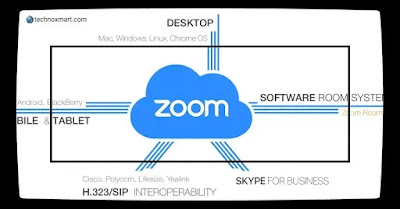Zoom Meetings Fault Exhibits Email & App
Images Of Users, Lacks End-To-End Encryption: Read Reports Here
Indeed
the written chat at Zoom is authenticated from end to end.
Zoom
has latterly become the go-to video conferencing platform (sorry Skype and
Hangouts) as a lot of individuals area unit currently operating remotely
whereas they practice self-isolation throughout the coronavirus outbreak.
However, Zoom has additionally been involved in some worrying security problems
within the past few days. And despite the corporate reassuring users that the
platform is secure, there area unit a couple of lapses because of the direction
of user information than will expose the non-public data of users. Also, Zoom
looks to point that it offers end-to-end coding for everything, however really,
solely text chats area unit end-to-end encrypted on its platform.

Zoom's Folly, User's Tragedy
Multiple
users have detected that they'll see the e-mail address of random individuals
and even their photos on their various Zoom profiles. Exposing email address to
strangers is an associate open invite to spam in your inbox, however, there's a
lot of worrying facets here. One will really begin a video decision with a
random person whose profile seems in their contacts, while not really
knowing them. So, how did this happen?
@zoom_us I just had a look at the free for private use version of Zoom and registered with my private email. I now got 1000 names, email addresses and even pictures of people in the company Directory. Is this intentional? #GDPR pic.twitter.com/bw5xZIGtSE— Jeroen J.V Lebon (@JJVLebon) March 23, 2020
Zoom
really maintains one thing referred to as ‘Company Directory' wherever area
unit all email addresses with identical name (save for generic ones like Gmail
and Yahoo) area unit listed along. Zoom apparently perceives similar name
endings as individuals operating within the same company, however apparently,
this methodology has its own flaws. If your email address has been extra to at
least one such ‘company directory', misunderstanding you as a colleague of
hundred others, random strangers will see your photos and even without your permission.
New: Zoom is leaking email addresses and photos of users to strangers. Zoom has treated some users who sign up with personal email addresses as if they're all part of the same company, letting them video call and see each other's info https://t.co/VooUc2b7xF— Joseph Cox (@josephfcox) March 31, 2020
When
Zoom was created conscious of the problem, the corporate blacklisted those domains."Zoom
operates a registry of domains and also proactively detects additional domains.
With respect to the different domains that you clearly outlined in your report,
the area unit is officially blacklisted", a Zoom exponent was quoted as
voice communication. Moreover, if your email address has additionally been
compromised by a faulty listing in Zoom's directory, you'll really request Zoom
to induce it removed. Zoom says on its web site that house owners or admins may
also value more highly to close up the directory inclusion feature.
No,
Zoom Video Calls Don't Seem To Be End-To-End Encrypted
“Zoom's
answer and security design provides end-to-end coding and meeting access
controls therefore information in transit can't be intercepted” says Zoom on its website. The statement makes one believe that Zoom calls area unit end-to-end
encrypted, however that is not extremely the case. “Currently, it's
insufferable to alter E2E coding for Zoom video conferences.
Zoom
video conferences use a blend of protocol and UDP. Protocol Relationships Area
Unit generated Persecution Unit TLS and UDP Region Communications Unit
authenticated with AES using a key mediated over a TLS link, "a Zoom
exponent was identified as Speech Exchange by The Intercept. The only material
that is authenticated on Zoom end-to-end is the text in the chats.
What
this suggests is Zoom will access the unencrypted video and audio content of
users' conferences. this can be not the definition of end-to-end coding.
End-to-end coding is once the content of a text or transmission spoken language
will solely be accessed and decrypted by the sender and receiver as a result of
they need the decoding keys, and not the service supplier itself.
This
is what happens after you use apps like Signal and WhatsApp, however, that's
not the case with Zoom. In broad terms, a third-party cannot listen in on your
Zoom video or audio spoken language, however the corporate itself will access
the contents. Of course, Zoom claims to abide by the privacy norms place in
situ, however, the means Zoom explains the protection facet of the platform on
its web site could be a bit deceptive.
For Regular & Fastest Tech News and Reviews, Take After TECHNOXMART on Twitter, Facebook, and Subscribe Here Now. By Subscribing You Will Get Our Daily Digest Headlines Every Morning Directly In Your Email Inbox. 【Join Our Whatsapp Group Here】















No comments:
Post a Comment